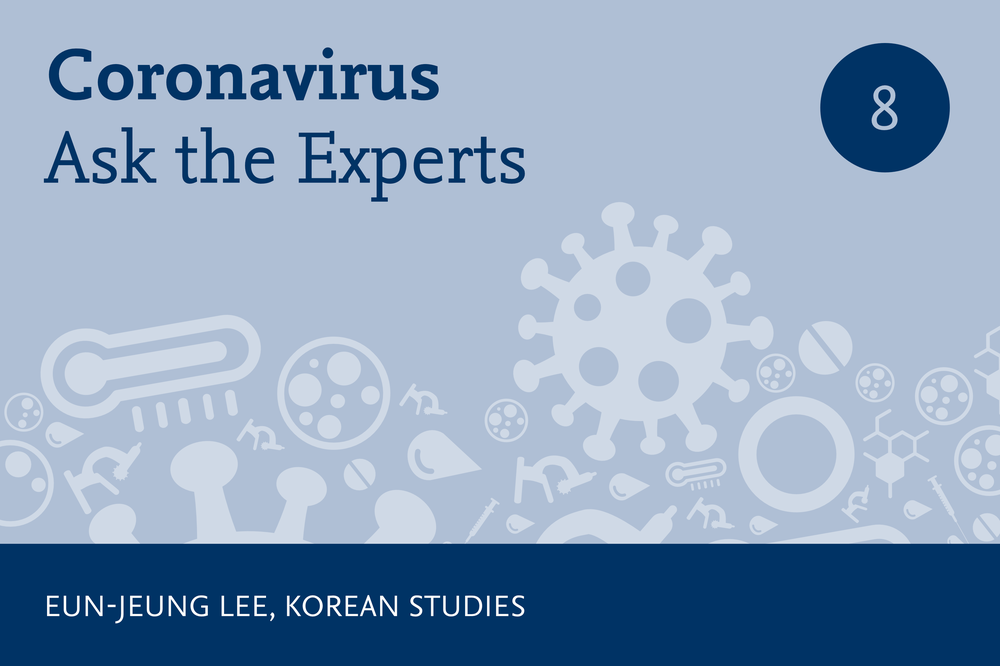“Many countries are now trying to learn from the Korean experience.”
Campus.leben series: “Coronavirus – Ask the Experts” / Part 8: Interview with Professor Eun-Jeung Lee, Director of the Institute of Korean Studies at Freie Universität Berlin
Apr 30, 2020
Based on past epidemics such as SARS and MERS, South Korea was better prepared for the coronavirus pandemic than European countries, says Korean studies scholar Prof. Dr. Eun-Jeung Lee.
Image Credit: shutterstock.com/khaleddesigner
What will change due to the corona pandemic? What consequences will it have for individuals, what impact will it have on society, politics, the economy, research, and culture? In the campus.leben series: “Coronavirus – Ask the Experts,” researchers at our university share their views on the current situation based on their professional backgrounds. In the current interview Raphael Rönn spoke with Professor Eun-Jeung Lee, the director of the Institute of Korean Studies at Freie Universität, about South Korea's success in containing the virus as well as about the situation in North Korea.
Professor Lee, the number of SARS-CoV-2 infections in South Korea is remarkably low. How did the Koreans manage to counteract the infections?
Prof. Dr. Eun-Jeung Lee is the director of the Institute of Korean Studies at Freie Universität Berlin.
Image Credit: Ludwig Niethammer
The Koreans have not yet managed to contain the virus completely, but at least they have slowed its spread significantly. There are several reasons for this: quick and extensive testing, thorough disinfection – to an extent that cannot be imagined here – and consistent measures to maintain the physical distance between people.
First, about the quick and extensive tests: The South Korean government recognized the risk of a massive spread of corona infections very early on and immediately set up a comprehensive testing system. As soon as a person is tested positive, their movements in public space are reconstructed. Contact persons are informed and tested immediately. The data come from data recorded during payments by card, as well as a special smartphone app.
In Germany and Europe there are concerns about using such apps because of data protection. In my opinion, a lot would be technically possible while maintaining data protection standards. It is no longer disputed in Germany that fast and precise tests are the first important step in the fight against the disease.
The second important aspect: thorough disinfection, which is particularly important for prevention. The fact that you should wash your hands frequently and not touch your face has almost passed into the DNA of the Koreans. But more importantly, all locations wherever a person was tested positive were thoroughly disinfected, be it a hotel, a restaurant, or a shop. All means of public transportation are not only cleaned, but thoroughly disinfected. This achievement by the health authorities is logistically very impressive.
And the third point: physical distance, i.e., keeping your distance – this includes self-quarantine and, on the other hand, wearing face masks, which have long been part of everyday life in South Korea and also in other parts of East Asia. Even if it is not certain how much you protect yourself with it, it is certain that you will protect others.
In South Korea, you naturally wear a mask when you have a cold and still have to go out. As for the self-quarantine: In South Korea, infected people and those who come into contact with infected people are not allowed to leave their homes for 14 days – not even to take out the garbage. During quarantine, it is strictly forbidden to come into contact with other people, even with people sharing the same household.
All of these measures, which were carried out very strictly, contributed to the fact that the curve of the infection numbers rose slowly, not exponentially, in February.
Were the Korean government and society better prepared for the COVID-19 pandemic than Germany and Europe?
Yes. Based on past epidemics such as SARS and MERS, the Korean government has systematically developed a pandemic plan. Already in January, when the first COVID-19 case occurred, action was taken and measures were taken. The government was able to keep the number of infections in Korea very low until mid-February. The number then rose sharply in connection with a Christian sect. During a service, many people became infected and carried the infection into their environment.
The South Korean government has done a lot since then and has followed WHO recommendations. The head of the Korean counterpart to the Robert Koch Institute is the key actor. She has the mandate to implement the measures. The Korean government operates under her direction. Trust in the government is very high.
What kind of discussions are there in South Korea as to when and how economic and personal life can get back to normal?
There was no shutdown in South Korea so far. However, normal business life is affected because Korea – like Germany – is very dependent on exports and the global economy. This also has an impact on domestic consumption. South Korea has a very large proportion of self-employed people, and there are many small businesses and retailers. They are all badly affected by the crisis. The government is looking for a solution, but normalization is not yet in sight.
Could the measures you described serve as a model for Germany and Europe?
I do not see any measure that could not be implemented consistently in Germany and Europe. Some people say that the Confucian culture of Korea is the reason for the success in fighting COVID-19, and that Europe cannot learn from Korea for that reason. I can only say that they should leave poor Confucius in his grave and not bring him out every time they discuss East Asia, which is not helpful in any case. However, many countries are now trying to learn from the Korean experience.
We talked about the measures against the pandemic in South Korea. What is the situation like in North Korea? Does any information leak outside the country? How would you rate the risk to the politically isolated country?
North Korea almost completely closed itself off in January. Since then, all returnees have been put into quarantine for 40 days. Many North Korea experts believe that due to the lack of medical equipment and medication – caused not least as a result of harsh international sanctions – North Korea would have a major problem with a pandemic such as that caused by COVID-19 unless it maintained total isolation. The only way is to close its borders.
We have no reliable information about the actual situation in North Korea. We can only hope that there will be no disaster and that the North Koreans will survive the pandemic well. We have heard that the students from Kim Il Sung University in Pyongyang who were in Berlin in January and took part in the FUBiS term at Freie Universität are fine.
Raphael Rönn conducted the interview.
The original German version of this article was published on April 23, 2020, in campus.leben, the online magazine of Freie Universität Berlin.
Further Information
Read all the interviews in the campus.leben series “Coronavirus – Ask the Experts”:
- Interview with Claudia Müller-Birn: “How should we design the tracing app so that people want to use it?”
- Interview with Tanja Börzel: “The European Union has proven its resilience in times of crisis”
- Interview with Professor Joachim Trebbe: “We are communicating more than usual in bubbles”
- Interview with Stefan Gosepath: How Just is Our Society in Times of Crisis?
- Interview with Carolin Auschra: “Organizations and systems often change in times of great crisis”
- Interview with Professor Hansjörg Dilger: “The coronavirus pandemic is a mirror of globalization and the inequalities it has produced”
- Interview with Lars Gerhold and Roman Peperhove: “Everyone is potentially affected, but everyone can also do something”
- Interview with Paul Nolte: “We are going to be working through this trauma for decades to come”
- Interview with Martin Voss: “If we choose to, we can lay the groundwork to shape the future”


